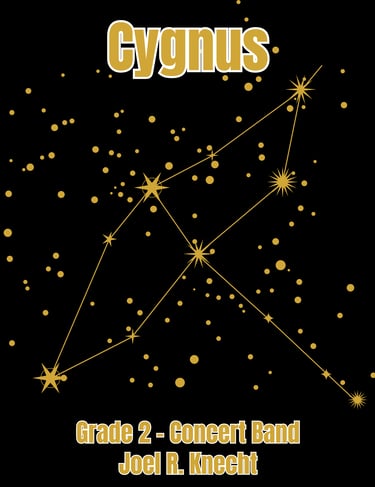

World Premier - Cygnus Starts at the 57:30 mark
Instrumentation
Flute
Oboe
Bassoon
Clarinet 1
Clarinet 2
Bass Clarinet
Alto Saxophone 1
Alto Saxophone 2
Tenor Saxophone
Baritone Saxophone
Trumpet 1
Trumpet 2
F Horn
Trombone
Euphonium (BC and TC)
Tuba
Timpani
Mallets 1
Mallets 2
Mallets 3
Wind Chimes
Suspended Cymbals
Rehearsal Notes
Sections 1, 2, and 3 (marked in the score) are all unmeasured (at both the beginning and at the ending). Each section should be given me in performance, probably around 10 seconds. Any mallet instrument will do, but Glockenspiel would be best.
For the best effect, the mallets should be spread around the auditorium, and multiple players can play on each part (best with 2-3 players per part). Each of these sections creates a soundscape meant to symbolize the stars twinkling in the night sky, so the performers should NOT try to play together, it should be a “beautiful chaos.”
The final measure should be played by a single mallet player, with each note cued by the conductor (the notes outline the flute melody found in the second section of the song)
Program Notes
Cygnus (also known as the Northern Cross) is a constellation and is the Greek word for Swan. It is one of the most recognizable constellations in the Northern hemisphere during the Summer and Fall seasons. Cygnus was one of the 48 constellations listed in the 2nd century by the astronomer Ptolemy and remains as one of the 88 modern constellations.
Cygnus has been linked with multiple swans found throughout Greek Mythology. Zeus disguised himself as a swan, Orpheus was transformed into a swan and placed in the sky next to his lyre and the King Cygnus was transformed into a swan as well.
Swans as animals are viewed as graceful and elegant creatures that find only one mate for their lifetime. This song tries to bring that gracefulness and eternal love to life through music.


